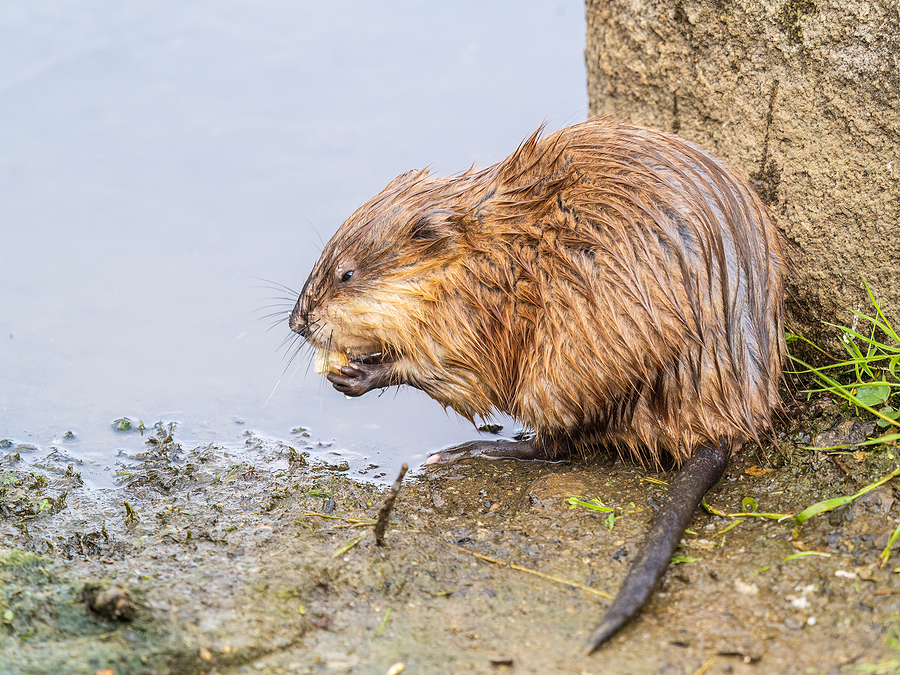Are pesky muskrats wreaking havoc on your serene garden or pristine property? These small, semi-aquatic rodents can become a big nuisance for gardeners, property managers, and homeowners. Known for their burrowing habits and voracious appetites, muskrats can cause significant damage to landscapes and water systems. This comprehensive guide will help you understand what muskrats are, why they’re a problem, and how to manage them safely and humanely.

Muskrat 101: What is a Muskrat?
Muskrats (Ondatra zibethicus), also known as the common muskrat, are native to North America and can be found throughout the United States and Canada. These furry creatures are typically brown or gray in color with a long, flattened tail. They have small eyes and ears, enabling them to navigate through water while diving for food.
Muskrats are semi-aquatic mammals that live near streams, ponds, rivers, and marshes. They are excellent swimmers and can hold their breath for up to 20 minutes underwater. Their habitats include dens or burrows dug into the banks of water bodies, which they create using their sharp front claws.
Signs of Muskrat Activity
Before you can tackle the problem, it’s crucial to confirm if muskrats are indeed the culprits. Here are some telltale signs:
- Burrow Entrances Near Water: Muskrat burrow entrances are typically located along the banks of ponds, lakes, and rivers. These burrows can weaken the structural integrity of the water body’s edge, leading to erosion and potential collapse.
- Floating Vegetation: If you notice small piles of floating plants or vegetation, muskrats might be at work. They often bring food to the water’s edge or onto floating platforms they build themselves.
- Disturbed Plants and Gardens: Muskrats feed on various aquatic plants, roots, and even garden vegetables. If you find chewed plants or missing crops, it could signal muskrat activity.
Risks and Damages Posed By Nearby Muskrats
Muskrats do not pose any direct threat to humans, but they can cause significant damage to properties and ecosystems. Understanding the potential harm muskrats can cause is essential in motivating proactive measures.
- Structural Damage: Muskrat burrows can compromise the structural integrity of dams, levees, and pond banks. This erosion can lead to costly repairs and safety hazards.
- Landscape Destruction: These rodents are not picky eaters. Gardens, lawns, and landscape plants are all at risk. Their feeding habits can ruin your hard-earned green spaces.
- Water Contamination: Muskrats often carry diseases such as tularemia and leptospirosis, which can contaminate water systems and pose health risks to humans and pets.
Safe Management Strategies
When it comes to managing muskrats, humane and environmentally friendly methods are the best approach. Here are some effective strategies:
- Live Trapping: Live trapping of muskrats should only be carried out by licensed professionals. They will place non-lethal traps near their burrow entrances and bait them with fruits or vegetables.
- Exclusion Techniques: Fencing off garden areas and reinforcing pond edges can help keep muskrats at bay. Use materials like galvanized wire mesh to prevent burrowing.
- Natural Repellents: Certain scents and substances can deter muskrats. Castor oil, ammonia-soaked rags, or commercial animal repellents can be effective when placed near burrow entrances.
Prevention Tips
Once you’ve managed the immediate problem, preventing future muskrat invasions is crucial.
- Regular Inspections: Conduct routine inspections around water bodies and gardens to identify early signs of muskrat activity. Early detection can prevent more extensive damage.
- Maintain Vegetation: Keep grass and aquatic vegetation trimmed around water sources. Muskrats prefer dense cover, so reducing this can make your property less attractive to them.
- Secure Food Sources: Make sure to secure trash bins, compost piles, and pet food. Reducing accessible food sources can discourage muskrats from settling in.
Conclusion
In conclusion, managing nuisance muskrats requires a combination of detection, safe removal, and prevention. By understanding their behavior and employing humane strategies, you can protect your property and maintain a harmonious environment. Share these tips with your community to help others manage muskrat issues effectively.
If you’re dealing with muskrat problems and need expert assistance, don’t hesitate to reach out to our wildlife removal company. Contact Budget Animal Removal at 615-337-9165 for TWRA licensed and insured Nashville, Tennessee animal removal for problematic muskrats and more. We serve commercial clients too.
Related Posts:
The Definitive Guide to Muskrat Control
What You Need to Do to Get Rid of Muskrats on Your Property
How to Safely and Effectively Control Beavers on Your Property

